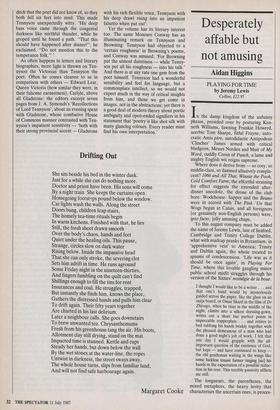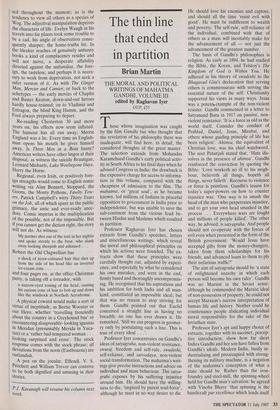Desperately affable but not amusing
Aidan Higgins
PLAYING FOR TIME by Jeremy Lewis Collins, £12.95 In the damp kingdom of the unfunny phrase, presided over by posturing Ken- neth Williams, fawning Frankie Howerd, acerbic Tom Sharpe, fitful Frayne, auto- cratic Aims pere, autodidactic Antipodean 'Clincher' James armed with critical bludgeon, Messrs Norden and Muir of My Word, cuddly Coren of Punch, a lame and mighty English wit reigns supreme.
Where does it derive from — so cosy, so middle-class, so damned allusively compla- cent? 1066 and All That, Winnie the Pooh, Cold Comfort Farm; the effortful straining for effect suggests the extended after- dinner anecdote, the drone of the club bore: Wodehouse. Sapper and the Beano were in accord with The Pink 'Un that Wogs began at Calais, and all foreigners (or genuinely non-English persons) were, ipso facto, jolly amusing chaps.
To this august company must be added the name of Jeremy Lewis, late of Seaford, Cambridge and Trinity College Dublin, what with madcap pranks in Byzantium, in 'apprehensive vein' to America; Trinity and Dublin again, the whole treated to spasms of condescension. 'Life was as it should be once again', in Playing For Time, where this lovable gangling minor public school misfit struggles through his version of the Sixties' nostalgic de la boue.
I thought! would like to be a writer. . . and that one's hand would by mysteriously guided across the paper, like the glass on an ouija board, or Omar Sharif in the film of Dr Zhivago, when he rises in the middle of the night, climbs into a silken dressing-gown, writes out a short but perfect poem in impeccable copperplate . . . and retires to bed rubbing his hands briskly together with the pleased demeanour of a man who had done a good night's job of work. I felt that one day I would grapple with the all- important question of the existence of God, but kept — and have continued to keep — the old gentleman waiting in the wings like some luckless tenant farmer ringing [sic] his hands in the expectation of a possible reduc- tion in his rent. This terrible passivity afflicts me still.
The longueurs, the parentheses, the mixed metaphors, the heavy levity that characterises the uncertain ones, is proces- sed throughout the memoir; as is the tendency to view all others as a species of Wog. The adjectival manipulation deprives the characters of life. Evelyn Waugh in his travels into far places took some trouble to be a cad, his angle of observation conse- quently sharper; the home-truths bit. In the bleaker reaches of genuinely unfunny books a kind of complacency resides and will not move, a desperate affability directed against the unfamiliar, the fore- ign, the tasteless; and perhaps it is neces- sary to work from deprivation, not seek a safer version of it. As with The Ginger Man, Mercier and Gamier; or back to the achetypes — the early movies of Chaplin and Buster Keaton, down-and-out heroes hardly house-trained; on to Vladimir and Estragon, the blind King Hamm, and the Fool always preparing to depart.
Re-reading Chesterton 30 and more years on, his effects now seem inflated. The humour has all run away; Merrie England was a lie. Every time an English- man opens his mouth he gives himself away. Is Three Men in a Boat funny? American writers have other lingos at their disposal, as witness the suicide Brautigan, Leonard Michaels, Lake Woebegone Days, Harry the Horse.
Regional, even Irish, or positively fore- ign strengths would come to English comic writing via Alan Bennett, Stoppard, the Goons, the Monty Pythons, FawIty Tow- ers, Patrick Campbell's witty Thirty Years on the Job, all of which spare us the public grimace, the antic and ever-ready anec- dote. Comic impetus is the multiplication Of the possible, not of the impossible. But if you cannot get the diction right, the story will not do. As witness:
My mother shot out of the tent in her nightie and spoke sternly to the bear, who slunk away looking sheepish and ashamed . .
Robert the Old Chigwellian has
a shock of straw-coloured hair that shot up from the side of his head like an inverted ice-cream cone . . .
and four pages on, at the office Christmas party, is taking off a toreador, with
a narrow-eyed tossing of the head, causing his curious cone of hair to bob up and down like the windsock at Northolt Aerodrome.
A physical coward would make a sort of virtue of ineptitude, as Bertie Wooster or our Hero, whether 'travelling frenziedly about the country in a Greyhound bus' or encountering disagreeable- looking iguanas In Meridan (presumably Merida in Yuca- tan) or a 'rather bad-tempered woman. . . looking surprised and cross'. The stock response comes with the stock phrase; all deviations from the norm (Eastbourne) are outlandish.
A pox on the jocular, Effendi. V. S. Pritchett and William Trevor can contrive to be both dignified and amusing in their stories.



















































 Previous page
Previous page